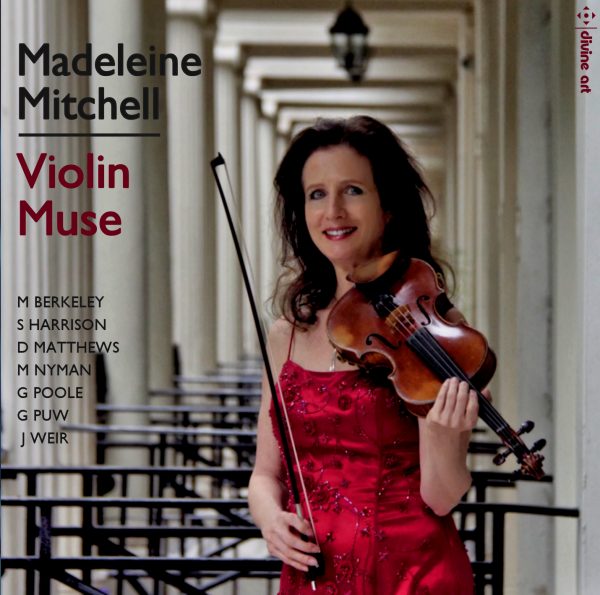Music Voice
The English violinist Madeleine Mitchell, is not only a very talented performer of classical repertoire, but also a specialist of the contemporary one – given also the fact that she has become a reference point for several living composers who have dedicated numerous works to her. This is especially true of the British scene in general, in which the violinist has made a great reputation. This record attests to Madeleine’s talent, presenting the interpreter under the guise of a Violin Muse, as the title of the recording work indicates. A “violin muse” able, first of all, to inspire, stimulate and involve composers in writing chamber and concert works for her instrument and then to become its sounding board, the star interpreter to whom to entrust its execution. This record, furthermore, has the merit to confirm the good health of Anglo-Saxon contemporary music through the proposition of seven works by as many authors, who actively collaborate with the violinist, born in Havering.
Seven composers, led by one of the fathers of Anglo-American minimalism, Michael Nyman (in whose 90s band Madeleine Mitchell was a player), who is also well known in our country. Madeleine performs two short pieces, “Taking it as Read” Nos 1 & 2, with piano accompaniment, songs that show us a more intimate and less histrionic Nyman. Very interesting is the “Soft Stillness” violin concerto by the Welsh composer Guto Pryderi Puw, in two movements and inspired by the Shakespearean play The Merchant of Venice, in which the research for lyricism, expressiveness and dissonance, shapes an undoubtedly involving work for the way in which violin and orchestra are in dialogue.
There is also no lack of contributions from female musicians with the Australian Sadie Harrison and the British Judith Weir; the first, taking up the rarified and eminently spiritual style of the Estonian composer Arvo Pärt, with “Aurea Luce” – musically emulating a passage of a hymn written by the first wife of the Roman philosopher Severino Boezio, the poet Elpis. The second, with “Atlantic Drift”, three pieces for two violins, expresses in a totally personal way the tradition of popular music of the British and North American islands, with an eloquence in which cultured rigour is combined with folkloristic themes of undoubtedly melodic and rhythmic gusto. And then Geoffrey Poole, whose “Rhapsody”, presented here in the version for violin and piano, is intended to be a tribute to Madeleine Mitchell’s violinism through the contemporary reinterpretation and reflection on a cornerstone of nineteenth-century chamber music, the famous Sonata op. 96 of Beethoven. Following David Matthews, with his “Romanza” Op. 119a, commissioned by Mitchell herself, in which a theme of waltz in 3/4 (a very rare time signature to find in contemporary works) is shaped and expanded through the violin of the English artist. And finally, Michael Berkeley, son of Lennox Berkeley, of whom Madeleine Mitchell performs the Veilleuse, a piece which balances tonal structure and modernist asperities – the latter trying to break the melodic and thoughtfully reflective line which evokes veiled and static nocturnal atmospheres.
What is striking in Madeleine Mitchell’s violinism is her ability to make the violin sing. Her expressivity is never divorced from an eloquence which is a legacy of a sound belonging to the great interpreters of the first half of the twentieth century. Of course, the pieces she performs are tailor-made for her, but the English artist manages to shape with her instrument the ideal interpretative attitude, ideally capturing each time the spirit of these authors’ scores. Also the other performers who accompany her, beginning with Nigel Clayton at the piano, the excellent Cerys Jones on the violin and the BBC National Orchestra of Wales, directed by Edwin Outwater, contribute to the success of this record, which is a very pleasant surprise in the Contemporary repertoire
Even the recorded sound, performed in different locations, is remarkable and excels in tonal balance (take as an example the perfect balance between violin and piano), as well as in the wide ranging dynamics in the concerto by Puw.
@divineartrecordingsgroup
Search
Newsletter
A First Inversion Company
Registered Office:
176-178 Pontefract Road, Cudworth, Barnsley S72 8BE
+44 1226 596703
Fort Worth, TX 76110
+1.682.233.4978












